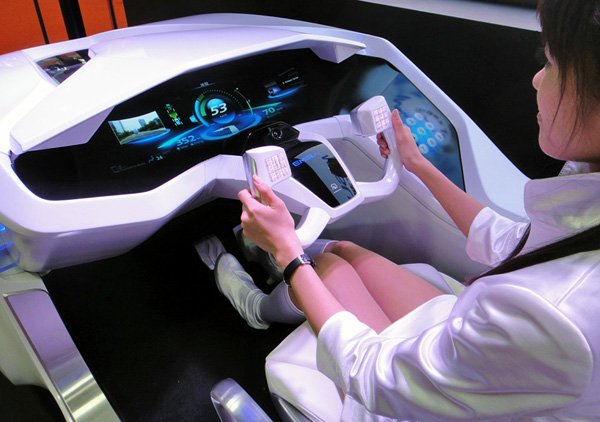How Can Automakers Add Value to Dashboard?

utomakers are lining up to offer Apple's CarPlay and Google's Android Auto, which aim to reduce distractions by allowing drivers to control their smartphones with voice commands and a simplified interface on the center-stack touch screen. Most major automakers are expected to follow Chevrolet, which last week said it would offer both systems across much of its lineup for 2016.
But the halo effect that automakers are seeking from aligning with two of the world's coolest brand names could be fleeting, analysts say. And, such moves risk undermining the investments they've made in developing their own embedded infotainment systems and cultivating brands such as Chevrolet's MyLink, Fiat Chrysler's Uconnect, Hyundai's Blue Link and Ford's Sync, they say.
"As soon as you enter into the Google or Apple experience, it's no longer about Chevrolet and the bow tie," IHS Automotive senior analyst Mark Boyadjis says. "Carmakers in general need to be very careful about how they implement this."
Chevy will have a head start by offering Android Auto and CarPlay on the Cruze and Malibu sedans, Silverado light- and heavy-duty pickups and a dozen other '16 models, starting this summer. But a few dozen other automotive brands are expected to soon offer one or both interfaces, including Ford, Jeep, Audi, Honda and Subaru.
"As soon as you enter into the Google or Apple experience, it's no longer about Chevrolet and the bow tie," IHS Automotive senior analyst Mark Boyadjis says. "Carmakers in general need to be very careful about how they implement this."
Chevy will have a head start by offering Android Auto and CarPlay on the Cruze and Malibu sedans, Silverado light- and heavy-duty pickups and a dozen other '16 models, starting this summer. But a few dozen other automotive brands are expected to soon offer one or both interfaces, including Ford, Jeep, Audi, Honda and Subaru.
As the dashboard interface becomes defined by the smartphone and more commoditized, it's incumbent on automakers to find other ways to deliver digital value to customers, says Thilo Koslowski, automotive practice leader at Gartner Research.
Letting the tech companies figure out how best to deliver music or text messaging makes sense, Koslowski says -- it's what they're good at. That frees up automakers to develop features specific to driving or vehicle maintenance, for example.
"Automakers are saying, 'We're not going to spend our time and resources on simply making the Pandoras of the world work better,'" Koslowski says. "Instead, they can focus on areas related specifically to the driver to differentiate themselves."
He points to a service introduced by GM this year that uses the vehicle's 4G LTE wireless Internet connection to provide OnStar subscribers feedback on their driving habits, potentially allowing responsible drivers to qualify for discounted insurance.
The feature is an example of why GM believes it still will have enough appealing features to differentiate itself from rivals that also will offer Android Auto and CarPlay.
"Our strategy going forward is not to walk away from the success we've had from our embedded infotainment systems," said Alicia Boler-Davis, GM's senior vice president of global connected customer experience. "Those are still very, very critical to our strategy and our brands."
Hyundai is taking a different approach. It's clearing the way for the Google and Apple experience, gambling that the association with tech industry leaders will elevate its own brand. Last week, it became the first automaker to offer Android Auto, now available on the 2015 Sonata.
Within a few years, more than 60 percent of the cars Hyundai sells in the U.S. are expected to ship with a stripped-down touch-screen system called Display Audio, which was designed as a vessel for Android Auto and CarPlay.
Cason Grover, a senior manager at Hyundai Motor America who oversees the program, says Hyundai will make clear that its Blue Link telematics system "is very much part of Display Audio, in addition to the enabled Apple and Google solutions."
Koslowski says automakers must view the emergence of Android Auto and CarPlay "as an opportunity" and "not the end of the need for innovation."
Related News


